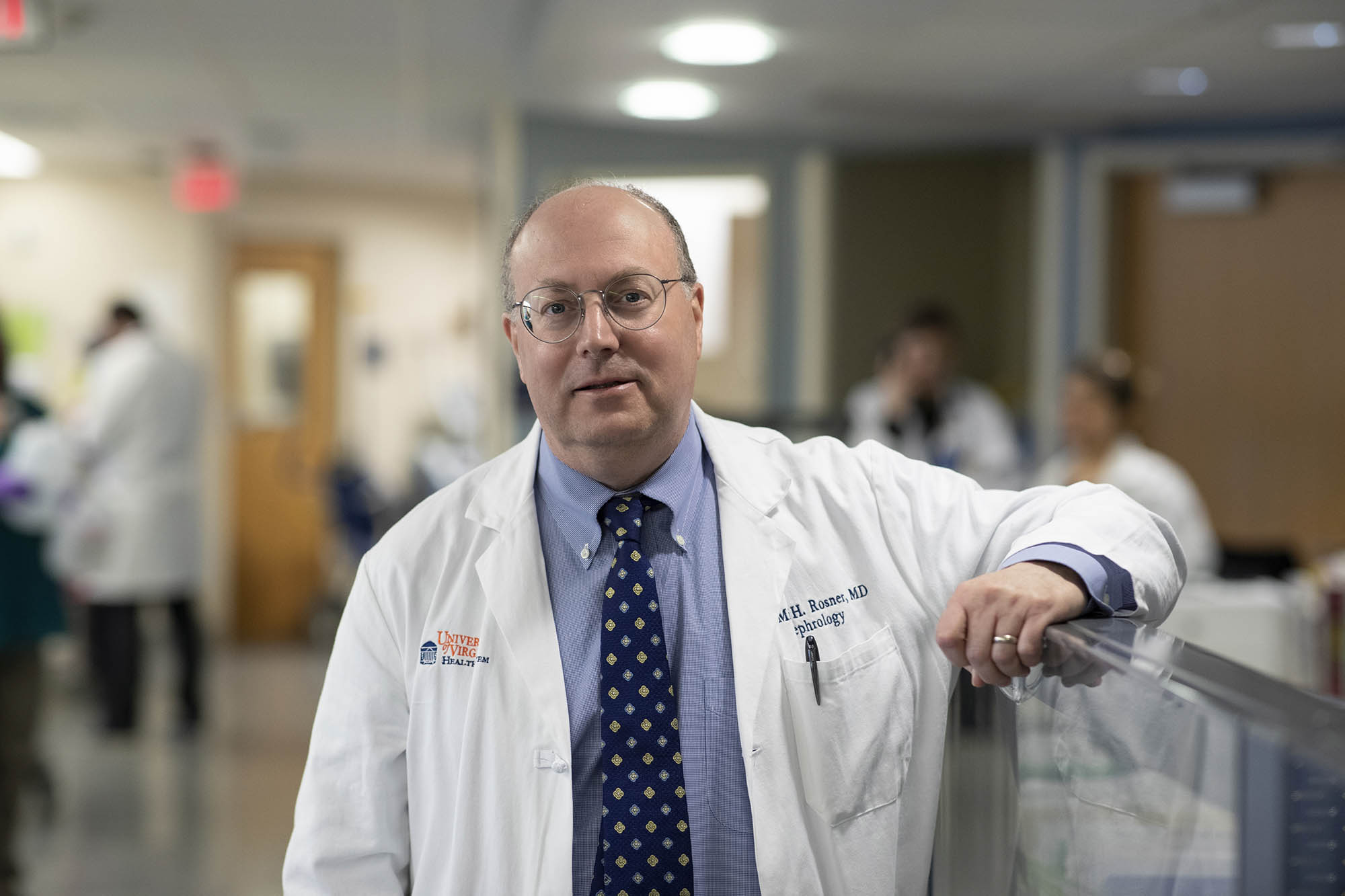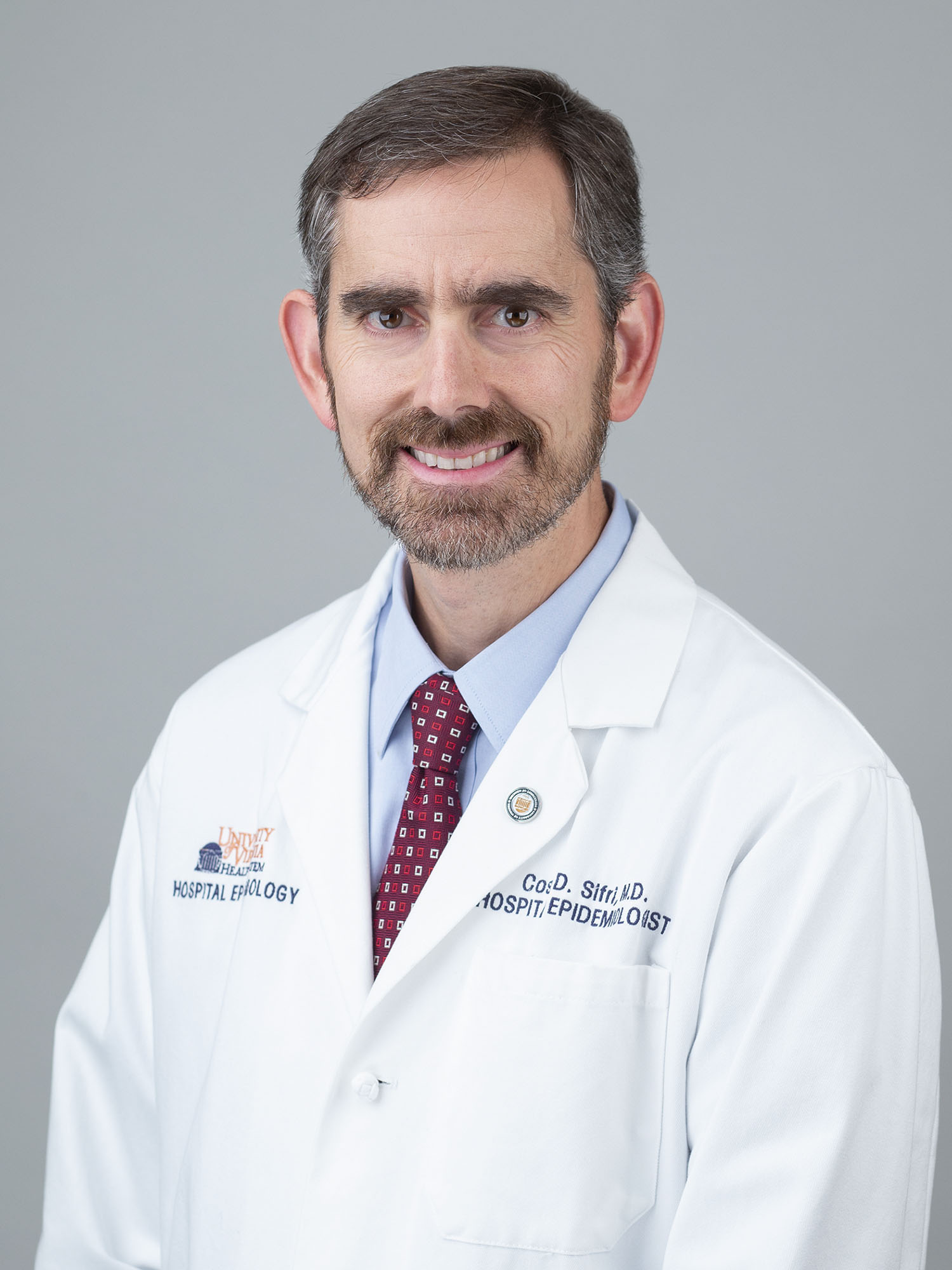Speaking to University of Virginia faculty and instructors in a virtual town hall Thursday, two public health experts reviewed the latest information about COVID-19 vaccinations and the delta variant of the virus.
Ultimately, Drs. Mitch Rosner and Costi Sifri said, UVA’s Grounds and classrooms are among the safest environments possible right now, given the very high vaccination rates among students, faculty and staff. As of the town hall, 92% of faculty and staff reported being fully vaccinated, including 96% of teaching and research faculty. Ninety-seven percent of UVA students are also fully vaccinated.
“Given these high vaccination rates, Grounds will be one of the safest places you can be at this point of the pandemic,” said Rosner, the Henry Mulholland Professor of Medicine and chair of the Department of Medicine. “The risk of contracting the virus will be much higher in community settings than it will be on Grounds.”
Rosner and Sifri, the director of hospital epidemiology at UVA Health, were joined by UVA Provost Liz Magill, who moderated the discussion and shared questions from the audience. A full recording of the town hall will be available on the University’s coronavirus website.
As the discussion began, Magill said that high vaccination rates among UVA community members have allowed the University to focus on a safe return to in-person instruction as a critical part of the UVA’s mission.
“We have emphasized a responsible return to the in-person experience that is a hallmark of UVA for teaching,” she said. “Teaching in person has been a key part of who we are, and the delivery of that teaching mission, in person, responsibly from a public health perspective, is something we have put a priority on after these long, many months of COVID.”
Still, Magill said, Rosner, Sifri, other public health experts and UVA leaders are monitoring the situation on a daily basis and are watching new information and data carefully in case changes must be made.
Questions About Breakthrough Infections
Many questions on Thursday focused on so-called “breakthrough” infections, referring to COVID-19 cases among fully vaccinated individuals.
Rosner said he is most concerned about transmission of the delta variant among unvaccinated individuals, as it has proven to be almost twice as transmissible among unvaccinated people as the original COVID-19 virus and is driving high rates of hospitalization and death around the country – again among unvaccinated populations.
Breakthrough cases remain relatively rare, he said, but should still be expected, especially given that the coronavirus is airborne. The vaccines might not always fight off the virus in nasal passages – resulting in a mild upper respiratory tract infection – but they are very effective in preventing more severe lower respiratory tract infections, he said.

Dr. Mitch Rosner is the Henry Mulholland Professor of Medicine and chair of the Department of Medicine. (Photo by Dan Addison, University Communications)
Importantly, Sifri added, current studies show that viral loads among vaccinated patients are close to those of unvaccinated patients at first, but decrease much more rapidly. While data is still being collected, this could indicate that the window for vaccinated patients to shed and transmit the virus is much shorter than that of unvaccinated patients, who carry high and sustained amounts of the virus well after initial infection.
“I would anticipate that the infectivity of vaccinated individuals is less than unvaccinated individuals,” Sifri said. “Unvaccinated individuals have early, high and sustained amounts of the virus to pass along.”
Rosner and Sifri also reiterated that the vaccines remain very effective in preventing hospitalization and death, even with the delta variant.
“Those who are vaccinated are protected against serious infections, hospitalization and death,” Rosner said.
Masks, Testing and Safety Measures
Rosner and Sifri also fielded questions about the safety measures UVA has put in place, especially related to prevalence testing. Currently, unvaccinated faculty, students or staff must be tested for the virus weekly.
Vaccinated students, faculty and staff are not required to be tested on a weekly basis, though they should get tested if they have symptoms or have been exposed to someone with COVID-19. Close contacts of those who have tested positive should be tested as well.
Additionally, employees who do not have symptoms, but would like to be tested, can request a self-administered nasal PCR COVID-19 test. More information is available on the UVA Human Resources Let’s Get Checked site. Students who are asymptomatic and want to be tested can make an appointment through Time2Test. You can also review testing practices on the UVA coronavirus website.
Asked why UVA is not conducting comprehensive prevalence testing for students, faculty and staff, Rosner said that current testing practices should provide a good view into COVID-19 on Grounds, while high vaccination rates, masking and improved ventilation and air filtration in classrooms provide layers of protection.

Dr. Costi Sifri is the director of hospital epidemiology at UVA Health. (UVA Health photo)
“If we do widespread prevalence testing, we could be isolating and quarantining a lot of people for infections that, in the vast majority of cases, would be mild or asymptomatic,” Rosner said, referring to possible breakthrough infections among vaccinated people. “We grapple every day with our goal of providing as normal an educational experience as possible while maintaining as safe of an environment as possible. We believe we have mitigated those risks through vaccination.
“We are doing a significant amount of testing, including prevalence testing for everyone who is not vaccinated. In addition, we are gaining data around cases that we detect and doing testing around those cases as part of our monitoring,” he said.
Going forward, officials will monitor daily case counts, hospitalization rates, appointments at Student Health and breakthrough infections reported by the Virginia Department of Health, among other data points.
“If we see trends that concern us, we are ready to pivot to stricter measures, if the data supports that need,” Rosner said.
Booster Shots
Rosner and Sifri also addressed booster shots, which are currently available at UVA Health for immunocompromised patients who might not have formed a strong response to the first doses of the vaccine.
“If you or a loved one are in that [immunocompromised] population, that is an important consideration and I would recommend you do that,” Sifri said.
For those who are fully vaccinated and not immunocompromised, President Joe Biden’s administration has indicated that booster shots will be available toward the end of September for the Pfizer and Moderna vaccines because data showed the vaccines’ efficacy could wane somewhat after six to eight months, in terms of preventing mild infections. They remain protective against severe infection.
“We have not seen a loss of efficacy in persons who have been COVID-vaccinated leading to hospitalization and death,” Sifri said. “The goal for the booster is to stem the tide [of infections].”
Anyone wishing to be vaccinated can make an appointment by calling 434-297-4829 or schedule an appointment here. More information about UVA’s coronavirus policies and procedures is available at coronavirus.virginia.edu, which is regularly updated.
Media Contact
Article Information
August 26, 2021
/content/public-health-experts-review-current-state-virus-precautions-faculty-town-hall

